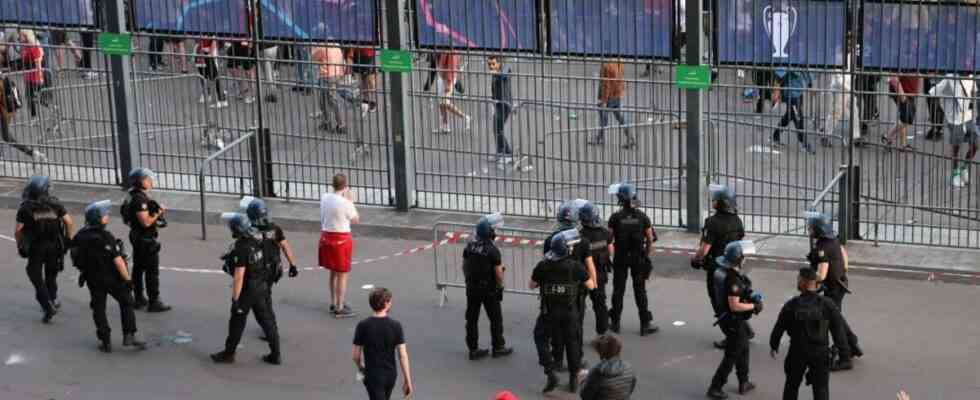Three days after the Champions League final, six people appeared before the Bobigny Criminal Court, in Seine-Saint-Denis. And among them, no English supporter. Three Peruvians, aged 21, 26, 39, who were found in possession of 14 stolen phones. A 24-year-old Algerian in an irregular situation who stole a Liverpool supporter’s cell phone on the platform at line 13 after the match (he was given a 6-month suspended prison sentence). A 34-year-old Palestinian man who stole a British victim’s necklace, bit off the arm of someone trying to intercept him, and punched a police officer in custody. And finally, a 25-year-old man who is accused of stealing the watch of a Mexican tourist who came to attend the meeting.
Saturday evening, while chaos reigned around the Stade de France, a hundred people were arrested by the police. A little less than half of them (48) had been placed in police custody, including a large number of minors. With the exception of the six men tried on Tuesday, all have been released. However, according to the mayor of Saint-Denis, “there have never been as many crime phenomena as there were last Saturday” around the sports arena which has been hosting major events for more than twenty years. “There have been multiple attacks, and it’s unbearable”, confided Mathieu Hanotin in an interview with BFM TV.
“The biggest thefts were committed at night”
The Minister of the Interior, he seems to prefer to blame the British supporters for the disorder which preceded the final. During the press conference he gave on Monday, Gérald Darmanin insisted on the presence of “30,000 to 40,000 English supporters” around the Stade de France, “either without tickets or with falsified tickets”. He relied on the report given to him by the prefect of police, Didier Lallement, to denounce a “massive, industrial and organized fraud of counterfeit notes”. The document consulted by 20 minutes hardly mentions the arrival of “300 to 400 young people from sensitive neighborhoods of Saint-Denis” who tried to “force the device” set up around the stadium. On the other hand, not a word about the thefts and assaults suffered by the spectators.
National delegate of the SGP-Police FO Unit union, Linda Kebbab explains, however, that her colleagues present on the spot on Saturday “had never seen that”. “As soon as people moved away from the field of vision of the police, in particular to go towards line 13, their arm was caught”, assures the trade unionist. “After the match, she adds, they stayed around the stadium. They were doing their market. Most of the thefts were committed at night. A massive and unusual presence of hundreds of offenders that evening which could be explained by several factors. Started with the RATP strike which did not allow the operation of line B of the RER which serves the stadium from Paris.
“It was poorly managed”
Most spectators therefore took line D and gathered from 7 p.m. at the pre-filtering point set up by the organizers. Several of them posted photos and videos of the stagnant crowd on social media. “The offenders took it for a call,” continues Linda Kebbab. “It smelled of money,” adds Mathieu Hanotin. Later, the prefect of police took the “decision to lift this barrier in order to prevent a tragedy because of the crowd which pressed” at the exit of a tunnel. Thus leaving the field open to thugs to access the surroundings of the stadium.
However, “the police system was intended to fight against hooliganism”, and not to deal with “acts of common law delinquency in significant proportions”, considers the mayor of Saint-Denis. A police officer present the evening of the match confirms. “It was badly handled. They put us in static in places where it was not moving. And they took forever to move us when there was a need for people elsewhere. We were then able to do the work,” he says.
Still according to this policeman, communication between the various units on site was “a bit complicated”. There was indeed “some violence between supporters at the end of the match”. But according to this agent, the disorder was mainly due to local criminals who came to rob the spectators. A problem that had been poorly anticipated by the authorities… And poorly managed at the time. The fault, believes Linda Kebbab, of the prefect of police who “did not know how to adapt to that”.

